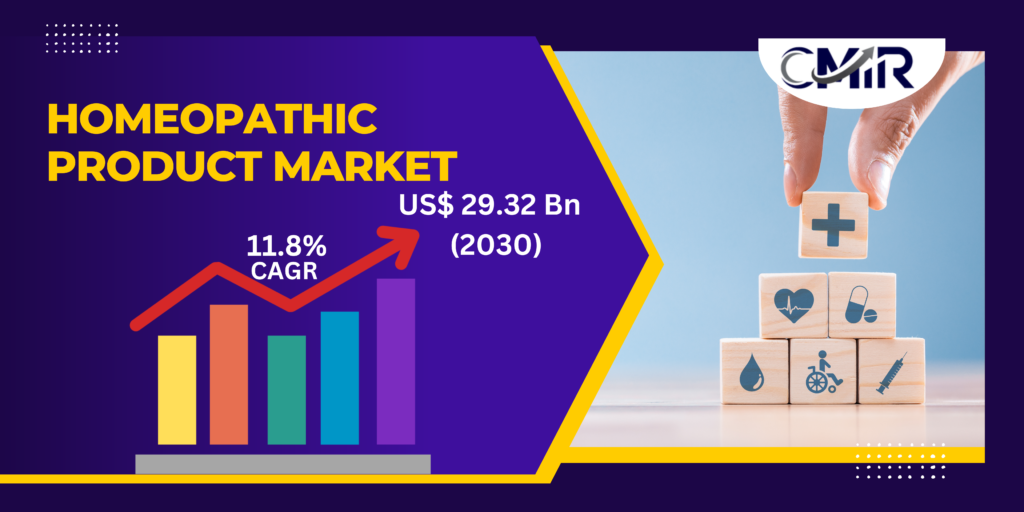Homeopathic remedies are highly diluted preparations made from natural substances, such as plants, minerals, and animals. They are used to treat a wide range of health conditions, including acute illnesses like colds and flu, as well as chronic conditions like allergies, arthritis, and depression.
Homeopathic remedies are prepared by diluting the original substance in water or alcohol and then vigorously shaking the solution. This process is known as succussion and is believed to enhance the therapeutic properties of the remedy. The more a remedy is diluted and succussed, the stronger its potency is believed to be.
The homeopathic market refers to the industry that produces and sells homeopathic remedies. Homeopathy is a form of alternative medicine that is based on the principle of “like cures like,” meaning that a substance that causes symptoms in a healthy person can be used to treat similar symptoms in a sick person.
The homeopathic market includes a variety of products, including pellets or tablets, liquid drops, creams or ointments, and other forms of homeopathic preparations.
The homeopathic products market is valued at US$ 12,025.4 million in 2022 and is anticipated to reach US$ 29,328 million by the end of 2030, expanding at a CAGR of 11.8% from 2023 to 2030 (forecast period).
Homeopathic Products Market to Recover Amid COVID-19 Pandemic
The homeopathic products market has shown some resilience during the COVID-19 pandemic, and is expected to recover as the world emerges from the crisis. While the pandemic has disrupted supply chains and distribution channels for many industries, the homeopathic market has been able to adapt to the changing landscape.
One of the reasons for this resilience is the growing interest in alternative and complementary medicine, as people look for ways to boost their immune systems and maintain their overall health. Homeopathy, which is a natural and holistic approach to healthcare, has seen increased interest from consumers during the pandemic.
Despite the positive outlook, it’s important to note that the COVID-19 pandemic has also raised concerns about the safety and efficacy of homeopathic remedies. While some studies suggest that homeopathy may have a placebo effect, others point to potential risks, particularly when used in place of conventional medical treatments.

Increasing demand for natural and alternative therapies for health and wellness to boost Homeopathic Products Market
The increasing demand for natural and alternative therapies for health and wellness is one of the primary driving factors for the growth of the homeopathic products market. This trend is driven by several factors, including a growing preference for non-invasive and non-toxic therapies, a desire for more personalized healthcare solutions, and an increasing awareness of the potential risks and side effects associated with conventional medications.
Consumers are becoming more interested in natural and alternative therapies, including homeopathy, as they seek to take a more holistic approach to their health and wellness. Homeopathic remedies are often seen as a safe and effective alternative to conventional medications, and they are also perceived as being more in tune with the body’s natural healing processes. Furthermore, homeopathic products are often made from natural ingredients, such as plants and minerals, which are perceived as being gentler on the body than synthetic chemicals. This makes them an attractive option for consumers who are looking to avoid the potential side effects of conventional medications.
Europe to Spearhead the Homeopathic Products Market
Europe is the fastest-growing segment in the homeopathic products market due to several factors, including:
- Historical roots: Homeopathy was developed in Europe in the 18th century by German physician Samuel Hahnemann. As a result, homeopathy has been widely practiced and accepted in Europe for centuries, and it has become an integral part of the region’s healthcare system.
- Regulatory framework: European countries have a well-established regulatory framework for homeopathic products. The European Medicines Agency (EMA) provides guidelines for the production and distribution of homeopathic medicines, ensuring their safety, quality, and efficacy.
- Demand: There is a high demand for homeopathic products in Europe, and consumers are willing to pay a premium for natural and alternative remedies. In addition, homeopathy is often covered by health insurance plans in Europe, making it more accessible to the general population.
- Education and training: There are many educational institutions and training programs in Europe that specialize in homeopathy. This has resulted in a large number of trained professionals who can offer homeopathic treatments and advise on the use of homeopathic products.
Competitive Insights
Companies operating in the homeopathic products market have adopted several growth strategies to expand their market share and increase their revenue. Some of the key growth strategies adopted by these companies include Boiron, Nelson & Co. Ltd. , Hyland’s Homeopathic, Dr. Reckeweg & Co. GmbH, A Nelson & Co. Ltd.
- Strong Brand Reputation: These companies have established a strong brand reputation in the market, with a history of producing high-quality and effective homeopathic products.
- Wide Range of Products: These companies offer a wide range of homeopathic products, catering to various health concerns and needs of consumers.
- Research and Development: These companies invest in research and development to constantly improve their products and create innovative solutions to meet the changing needs of consumers.
- Distribution Network: These companies have a well-established distribution network, making their products easily accessible to consumers.
- Consumer Awareness: These companies have also contributed to increasing consumer awareness about the benefits of homeopathy, which has helped in increasing the demand for their products.
Overall, these growth strategies enable companies to expand their market presence, develop new products, and increase their revenue in the homeopathic products market.



